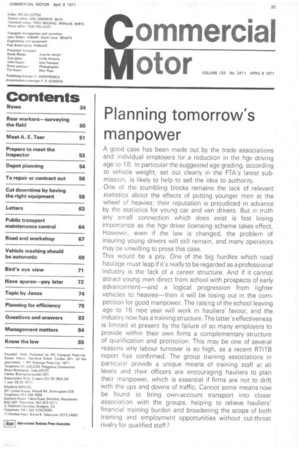Planning tomorrow's manpower
Page 35

If you've noticed an error in this article please click here to report it so we can fix it.
A good case has been made out by the trade associations and individual employers for a reduction in the hgv driving age to 18. In particular the suggested age grading, according to vehicle weight, set out clearly in the ETA's latest submission, is likely to help to sell the idea to authority.
One of the stumbling blocks remains the lack of relevant statistics about the effects of putting younger men at the wheel of heavies: their reputation is prejudiced in advance by the statistics for young car and van drivers. But in truth any small connection which does exist is fast losing importance as the hgv driver licensing scheme takes effect. However, even if the law is changed, the problem of insuring young drivers will still remain, and many operators may be unwilling to press this case.
This would be a pity. One of the big hurdles which road haulage must leap if it's really to be regarded as a professional industry is the lack of a career structure. And if it cannot attract young men direct from school with prospects of early advancement—and a logical progression from lighter vehicles to heavies—then it will be losing out in the competition for good manpower. The raising of the school leaving age to 16 next year will work in hauliers' favour, and the industry now has a training structure. The latter'seffectiveness is limited at present by the failure of so many employers to provide within their own firms a complementary structure of qualification and promotion. This may be one of several reasons why labour turnover is so high, as a recent RTITB report has confirmed. The group training associations in particular provide a unique means of training staff at all levels and their officers are encouraging hauliers to plan their manpower, which. is essential if firms are not to drift with the ups and downs of traffic. Cannot some means now be found to bring own-account transport into closer association with the groups, helping to relieve hauliers' financial training burden and broadening the scope of both training and employment opportunities without cut-throat rivalry for qualified staff ?




































































































































